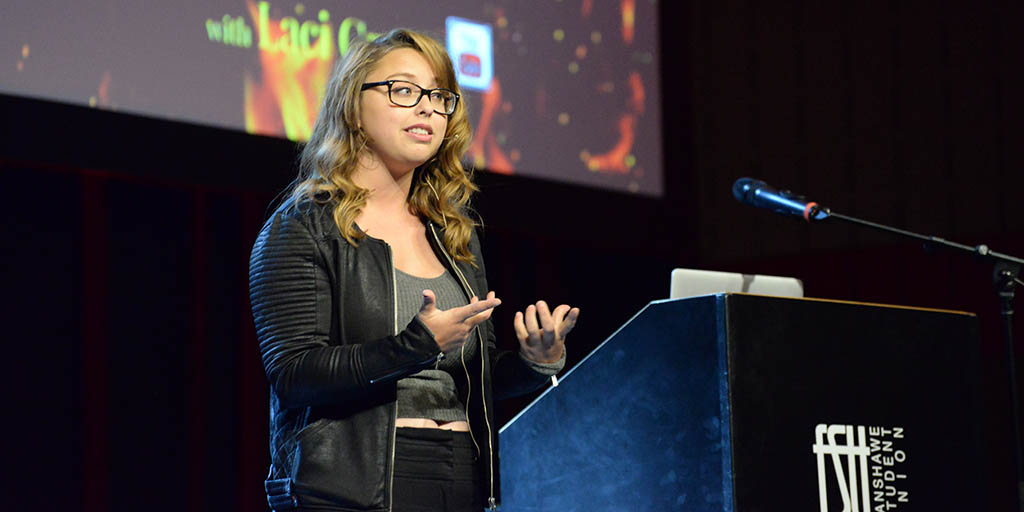Laci Green wants students to know they can help end sexual violence
 CREDIT: SIMON DUNFORD
CREDIT: SIMON DUNFORDLaci Green spoke to Fanshawe students on campus about the broader spectrum of sexual violence.
YouTube sexpert Laci Green made her way back to Fanshawe as part of her “Taking Down Rape Culture” tour on Sept. 15.
This stop was one of many across a number of North American colleges and universities.
Green previously stopped by Fanshawe last winter during her “Best Sex Ever!” tour.
The show was spear-headed by Leah Marshall, Fanshawe’s sexual violence prevention advisor, alongside the rest of the Sexual Violence Prevention Committee, and the Fanshawe Student Union (FSU).
This time around, Green focused on the broader spectrum of sexual violence and what can be done to help end it.
Statistics show that one in four female students and one in six male students experience sexual violence while getting their degrees. The statistics for marginalized groups are even worse.
Before the show began, Interrobang sat down with Green to get some more insight to what viewers could expect to see, and what her main message is to students about the issue of sexual violence.
“I had such an awesome time last time [at Fanshawe] and I really love this student body, and I love all of this staff and how supportive they are and how much they care.” Green said. “The people here are very passionate and that comes through and it’s always nice to be in a place where you can feel that from people.”
Green said when talking about sexual violence, there tends to be a lot of hostility, debate and divisiveness among people, and so her goal throughout the show was to be productive and to include many people during her talk.
The audience was a mix of students and older people, both listening intently and providing comments throughout the show.
Rylee Ellis, an early childhood education student, was excited for the show.
“She’s so inspirational and she teaches good lessons and she’s actually helped me out through my personal life, so it’s a pretty big deal,” Ellis said.
Green’s message throughout the show was simple, yet still something society is trying to grapple with.
“The message that I want to get across is that each of the students in the audience has the power to help end [sexual assault], and only by working together will that happen,” Green said.
Green said there are a number of reasons why it’s important to have this kind of talk on campuses.
For starters, Green said sexual assault is “absolutely prevalent” on college campuses.
“This is a time when a lot of young people are together, you see each other every day, and you’re living close to each other. These issues come up and they need to be dealt with,” Green said.
Green also said having a talk like this on campus is important because students and young people alike are the future and are “the solution,” to help end sexual violence.
“You are here to learn about your interests, to learn about the things you want to do in the world, and I think it’s important to understand how this issue intersects with whatever that may be. So that everyone, every student who graduates and goes into the working world can be an advocate and can help be a contributor to ending this problem,” Green said.
Green said that with her shows, she wants people to understand that sexual assault is not an“inevitability”.
“It’s not something that is going to happen no matter what. It is something that can end, there are solutions,” Green said.
Green said though she frequently hears people questioning if sexual violence can be put to rest, she believes it can be.
“We just need to be willing to do them [solutions] and be proactive about it,” Green said.
Overall, Green said that on an individual level, people need to speak up if they see or experience anything wrong.
“I think that people need to be proactive, to keep an eye on people in their community, take care of each other, know that you have support and love [from] people who love you,” Green said. If you find yourself on the receiving end of sexual violence, [know] that it’s okay to come forward and it’s okay to talk about it. On an individual level, I hope that that comes through.”
Spiro Vassallo, a Fanshawe police foundations student said he came to the show because he supports Green’s views on feminism and the positive image she promotes for young women.
He also wanted to find out more ways to get involved in trying to end sexual violence.
“I have a sister and she’s my best friend and I would hate for anything to happen to her, and I’m all about promoting the safety of the community because I do want to become a police officer,” Vassallo said. “So I feel it’s important for not only females but males to be involved in the whole movement.”
Recent Fanshawe graduate Susan Chaly, who saw Green at her previous show on campus, said that the information she gained there was helpful and hoped for a similar experience this time.
“I feel like sexual awareness and all of it is so important,” Chaly said. “Especially at this age because everybody is just learning new things and it’s the time that they have a lot of freedom so they just let go in every way and they have no boundaries or limits or controls, and you need that education to come in place.”
Green has over 1.5 million You- Tube subscribers to her channel and was named one of the 30 most influential people on the Internet, by Time magazine.













